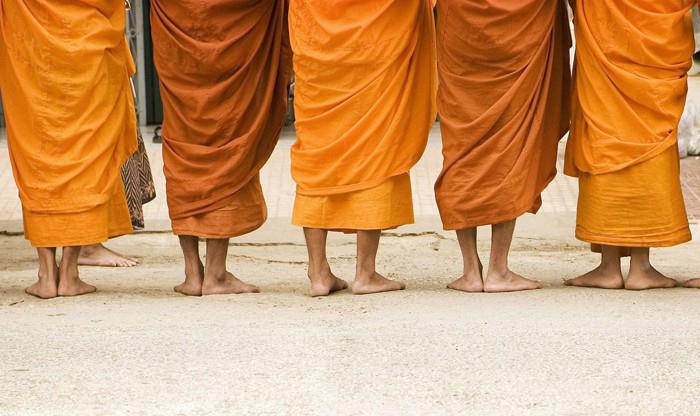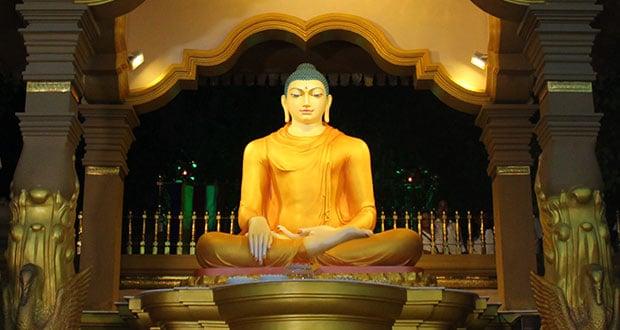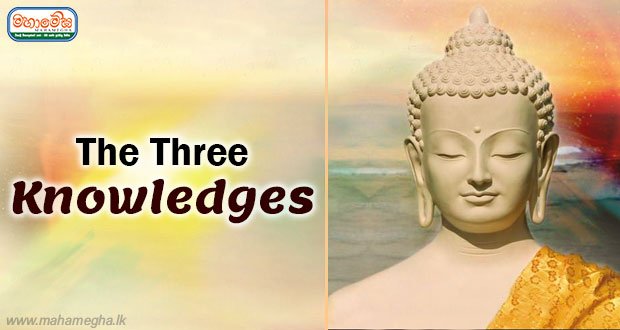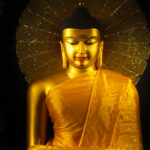The Buddha divided people into two categories as Asuthawa Puthujjan and Suthawa Ariya Sawako. Asuthawa Puthujjano – are the people who have not had the opportunity to listen and learn the Dhamma or those who do not live according to Dhamma even after listening.
Suthawa Ariya Sawako – are the true disciples of the Buddha who listen to the Dhamma and live by it or try with all their might to live by it.
There are many great differences among the two groups and one main difference is in the way they react to the situations that life brings along.
As we all know life has its happy moments and its sad moments and also it has, not sad or not particularly happy moments too. What makes you happy? Anything beautiful and alluring that can be seen, heard, taste, smell or touch makes you happy. An actor, an athlete, a new house or a new dress that you see makes you happy. A nice music you hear, or a voice of a person you like makes you happy. A tasty meal, hot cup of tea or sweets makes you happy. A good perfume or air fresheners are designed to make you happy. A comfortable chair, metres, carpet or even grass can make you happy. Revisiting those pleasurable things with your mind can also make you happy.
What triggers sadness in you? Anything that is distasteful, disgustful and hurtful that can be seen, heard, taste, smell or touch makes you sad. Seeing someone sick or die makes you sad. Hearing someone scold you makes you sad. Tasting irritable things make you want to vomit. Bad smells immediately makes you close your nose. Any uncomfortable surface that you touch makes you want to move away from it. Recalling unpleasant things makes you sad.
What causes the feeling of neither happy nor sad? Anything ordinary would trigger this feeling. For example an ordinary street lamp. Will that make you particularly happy or sad? No. Likewise anything ordinary that we hear, smell, taste, touch or think triggers this type of moments in life.
If we pay some attention to this, we can see that all these moments are actually sensations grasped through our sense organs; the eye, ear, nose, tongue, body and mind.
The Buddha explains how feeling/sensation arises in its completeness. The sensation arises when passa arise. ‘Thinnan sangathi passo.’ Passa is the process of three things coming together; sense faculty, object and the consciousness. Passa arises when these three things come together. When the eye, visual object and eye consciousness come together at the eye, sensation arises. The type of the passa determines the type of the sensation.
A pleasant object, sense faculty and consciousness coming together will give rise to a happy feeling. An unpleasant object, sense faculty and consciousness coming together will give rise to a sad feeling. A neutral object, sense faculty and consciousness coming together will give rise to a neither happy nor sad feeling. It is the same to ears, nose, tongue body and mind. When the mind, thought and mind consciousness come together at the mind a sensation will arise.
Therefore, the feeling a person feels is a result of a cause. There is no doer in it. There is no ‘I’ in it. The feeling cannot be held on. It depends completely on the type of passa. When passa changes the feeling changes. The feeling is not permanent. Therefore, it is not ‘mine’. For example think you are watching TV. You see something very saddening so you quickly change the channel with your remote controller and you see a beautiful actress. And in that split second your feeling of sadness changes in to happiness. This process happens so fast through all six sense faculties. Unless a Buddha explains this is what happens no one can ever know that this is just a cause and effect process and there is no ‘me’, ‘my’ or ‘mine’ in it. We feel like we a keep a feeling last long, but what actually happens is that we revisit the object we saw, heard, tasted, smelled or felt with our mind and we keep feeling the resulting feeling.
Now let us see the Buddha’s explanation on what happens when the two types of people experience feelings. When an Asuthawa Puthujjana – we will call him a worldling – experiences happiness he indulges himself in it. Desire, which is one of the three main roots of defilements, activates and combines itself with the happiness the person is experiencing. Then the worldling gets bound to his feeling and performs deeds that form kamma which ensure birth.
When a worldling experiences sadness deep rooted defilement, anger, surfaces and combines with his feeling of sadness. It happens so fast we mostly we are confused whether we are sad or angry. Thereafter, anything the worldling say, do or think will form kamma prolonging his existence in sansara – cycle of rebirth.
When a worldling is experiencing neither happy nor sad sensation, deeply rooted defilement moha comes into play. Moha is the third of the three main roots of defilements, which is known as delusion. So he feels the sensation of neither happy nor sad combined with the defilement of moha. And his kamma formation continues.
Therefore, whenever a worldling is feeling any sensation he is always feeling it with defilements. His feelings are never alone. These three types of feelings are experienced with all six faculties; eyes, ears, nose, tongue, body and mind. Every time a worldling sees, hears, smells, tastes, touches or thinks the feeling – happy, sad or neutral- he experiences is contaminated with defilements. And his actions which are based on the sensation will accumulate kamma. When there is kamma formation there is birth. When there is birth there is age, decay, death and the whole mass of dukkha.
What happens when a Suthawa Ariya Sawaka – we will call him a true disciple of the Buddha- experiences sensation? A true disciple of the Buddha listens to the Dhamma, remembers the Dhamma, practices the exact words of the Buddha, contemplate Dhamma by applying it to his life and tries ever so hard to realise the true word of the Buddha. A true disciple listens and learns how a sensation comes to be.
When a true disciple experience happiness he know it arises due to a contact at one of the sense faculties. It could be through the eyes, ears, nose, tongue, body or mind. Also he knows that the feeling is impermanent and cannot be held on to it. The feeling changes when ‘passa’ changes. It is not ‘mine’. Therefore, the desire arsing through the feeling will diminish. He will not act upon his desire. He will not be accumulating bad kamma but will be heading towards liberation.
When a true disciple feels sad he knows that it is a result of passa. Let’s say he heard someone blaming him and felt sad. He quickly realises that it occurred due to the contact at the ear and it is not permanent. He sees the cause and effect phenomenon and that there is no ‘self’ in it. That knowledge helps him not to prolong his anger but to rid it. And he is disciplining himself in the noble path.
When a true disciple experience a neither happy nor sad feeling, and if fear arises due to that feeling he quickly identifies it as a feeling caused by passa. He knows that it is impermanent and changes with passa. He will not act upon his defilements. His life here and hereafter will be good.
When you do not know the feeling arises due a cause, you accept the feeling as ‘yours’. And since every feeling is combined with defilements it conquers you and takes the better of you.
It is really up to you to decide whether you want to continue in this cause and effect process deluded as it is ‘me’ and ‘mine’ or come to light and put an end to it!
by Prajapathi jayawardane














Recent Comments